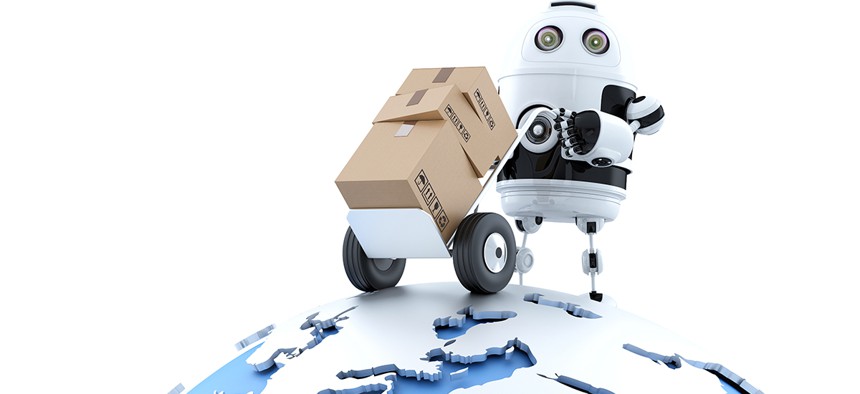Adorable Self-Driving Robots Will Start Making Deliveries in Europe This Month

kirill_makarov/Shutterstock.com
The Starship delivery bots will be stationed at kitchens, delivery hubs and supermarkets in London, Düsseldorf, Bern and Hamburg.
Remember those little six-wheeled robots we told you about in April? They’re now set for a commercial rollout in London and three other European cities.
The robots, from Starship Technologies, will be deployed this month to make deliveries for food-ordering services Just Eat and Pronto, and carry packages for courier service Hermes and supermarket Metro Group.
The Starship delivery bots will be stationed at kitchens, delivery hubs and supermarkets in London, Düsseldorf, Bern, and Hamburg. When an order comes in, the bots will drive themselves to collect their cargo, store it in their holds (which can take about two shopping bags’ worth of stuff), then trundle on to their destinations. When the robot arrives, the recipient unlocks it by punching in a security code on a mobile app.
The goal for Starship and its partners is to shave time and costs from what they call “last-mile” logistics, that is, getting an item from a nearby hub to its final destination. Think of a delivery van stopping and starting dozens of times as the driver drops packages off in a neighborhood.
Starship estimates it currently costs up to £12 to have a package delivered on-demand in central London. Its plan is to get that number down to £1 per delivery. It’s banking on its robots’ electric motors and autonomous driving capabilities to get it there.
James Roy Poulter, a co-founder of Pronto, is rhapsodic about the effect Starship’s bots will have on his business. London-based Pronto both cooks and delivers meals to its customers, and it currently operates a fleet of scooters and bicycles to do this.
Poulter envisions custom-built Pronto kitchens with “cat flaps” for the robots to enter and exit, forming a stream of automated, on-demand, delivery machines that will cut delivery times and costs.
“We want hundreds of these now and thousands next year,” Poulter says.
The reality is more prosaic. Starship doesn’t have exact figures, but says “dozens” of machines will be available to partners. These robots won’t be able to drive themselves at first. Instead, they’ll be remotely piloted by Starship employees, who will guide them over their new routes using the nine cameras that each machine is outfitted with.
Over time, the bots build up a map of their delivery areas and will be able to operate with greater degrees of autonomy. These maps are shared between units, so robots don’t need to retrace earlier routes.
Poulter says his firm paid a “token fee” to use the bots. Starship won’t say how much it’s charging its other partners to use the machines. The firm says that each deal includes robot servicing and pilots, and these services will likely be included in its planned business model, which will include a monthly fee from the company leasing the robots.
Pronto customers will be notified a drone is delivering their food, and the robot pilots will be responsible for talking to recipients. The machines are outfitted with microphones and speakers, which will allow the pilot to verbally check with a recipient that the cargo is in order.
Each robot must initially be operated by a pilot, although Starship says says up to 100 machines can be monitored by a single human as greater autonomy is achieved.
Starship says it has tested its bots over 5,000 miles, during which they have encountered more than 400,000 humans without incident. According to the bot-maker, two-thirds of people who encountered a machine ignored it after an initial glance. The rest had largely positive responses to the robots, according to Starship. This suggests people are more comfortable with the idea of rolling bots than flying drones dropping off packages.
Still, Starship is convinced that accidents involving its machines are inevitable.
“When we have thousands of robots out there, it will be a matter of time,” says Henry Harris-Burland, Starship’s spokesperson. “We have done the maths.”





